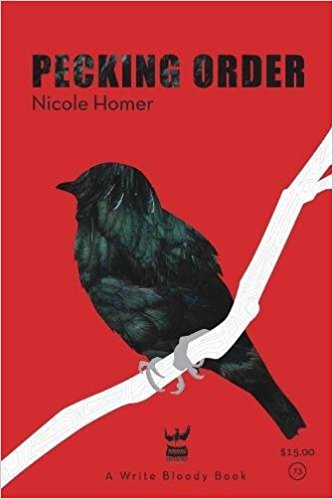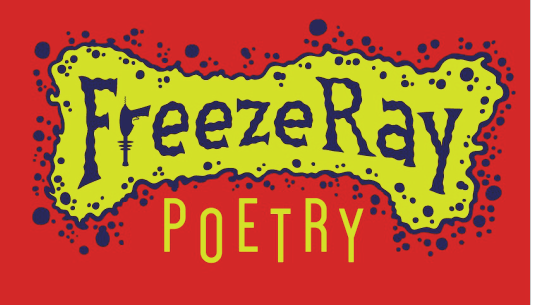
If you watch the CW series The Flash or are just a comic nerd in general, you will know of the concept of a multiverse. Parallel Earths, vibrating at different frequencies, but all existing within one space. I would like to submit to you that after reading Nicole Homer’s first full-length poetry collection Pecking Order, that Homer may be the newest multiverse in existence. There are many Nicoles in this book but they are all one Nicole Homer.
You may best know Nicole from her Walking Dead recaps and other pop culture goodness over at Black Nerd Problems (including the only movie review show you’ll ever need, “Nicole and Omar Hate Everything”) and to discover her poetry is to pull up a seat at the Real Talk Table and be blown away by the sheer force of her honesty. What is it like to be a mother? A black mother? A black mother affected by colorism inside and outside of her home? Poems like “Things Only A Black Mother Can Prepare You For” and “The Colorist” shed insight via story and dialogue in a way that is both compelling and unflinchingly honest.
Pecking Order is peppered with dialogues and monologues from many perspectives in the motherhood universe, specifically existing in Black American motherhood (“The Children Speak”, “Portrait of My Grammama on her Grammama’s Lap, Neither of Them Smiling”, and the acerbically perfect “The Woman Who Is Not The Nanny Answers At The Grocery Store Concerning The Evidently Mismatched Children In and around Her Cart”) via many voices threaded through the same family. In “Townies”, Homer states “No one lives in The Town of Motherhood/ but me/ says every mother/ including me” and through these poems, we are given a tour of this town (which is many towns, which is many mothers, but only one--the multiverse of motherhood).
This tour is not always and often very deliberately not pretty. “The Paper Trail” begins with the narrative:
In the driveway, the soft and squeaking toys and jagged gravel press into each other. In the kitchen, the dishes, dirty and chipped, are piled in the sink. The dining room the table is almost imaginary, under the crayons, pencils, papers...
And this kind of earnestness in the face of owning her role as a mother and woman and human continues on in addressing depression and fatigue in poems like “Threshold” “Hunger” and the succinct power of “Motherhood”:
Motherhood is like
being pecked
to death
by my
favorite birds
made from my
body, torn
by beaks sharpened
on the woman
I was
when I slept more
or sang the song I stole
out of
my mother’s mouth
That is the scariest thing:
that we do it anyway. The blood, the screams, the milk.
The dynamics of Homer both being raised in and raising a multiracial family are addressed throughout the book, from outside perspectives like “Casual Racist” to inner monologues like “The Lottery”; in “Things I Want To Say To Rae Dawn Chong”, the poet to the actress:
But you and Arnold in Commando. Oh, Rae, you two were unlikely and perfect and snapshot one-liner. You were the first people on TV that I understood. You had nothing in common. My father hated grits. My mother is from the south, Rae. Do you understand? What do the Chinese and Scottish or the Africans and the Canadians have in common except you?
For every question asked and examined throughout Pecking Order, family inevitably answers back, as in “When I Had Children With A White Person”:
...in our house / we say family in both of our mouths with every tongue we have
Homer ends this collection with the poem “I Wish I Was More Mothers (after Brenda Shaunessy}” and as we are left with this wishlist anthem, we realize that these words vibrate at such a necessary frequency that, even if Nicole Homer doesn’t realize it, she is more mothers. One and all.
--Rob Sturma
Pecking Order is available from Write Bloody Publishing and from the author’s website at nicolehomer.com.

 RSS Feed
RSS Feed